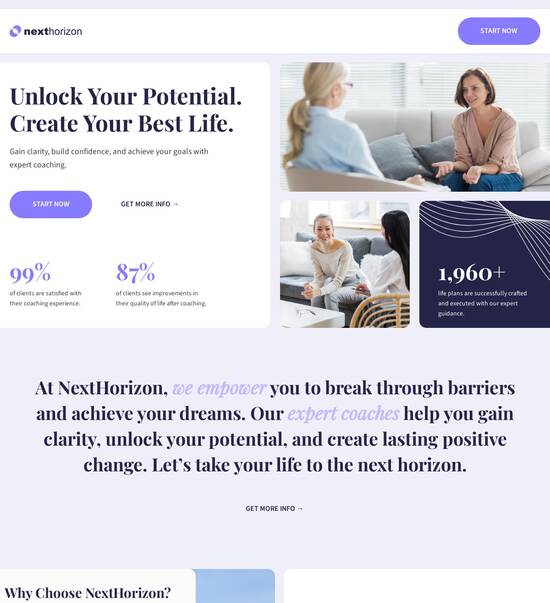
Landing page template with interactive real estate form
Explore Similar TemplatesAbout template
Use landing page templates with interactive real estate form and make your communications easy and transparent. Try our solution today.
Recommended templates

Easy to build without coding
With the intuitive drag-and-drop builder, anyone on your team can create high-converting pages without any knowledge of code or design. Make enhancements to your landing page with custom widgets using Javascript, HTML/CSS, or third-party scripts.

Multiple layouts for any industry and goal
Select from 500+ landing page layouts built to boost conversions across industry-specific scenarios. Customize them by adjusting fonts, adding images, and generating on-brand content with the AI assistant. Quickly scale with Instablocks® and Global Blocks that you can save, reuse, and update globally.

Loads fast and looks polished on any device
Every template is responsive, which means they present professionally on any device and load blazingly fast with our Thor Render Engine. You can also power them up with Google AMP technology to deliver an unparalleled mobile experience and drive higher conversions.

Robust analytics & experimentation
Get real-time updates and reporting across all your devices, showing the number of visitors, conversions, cost-per-visitor, and cost-per-lead. Launch AI-powered experiments, run A/B tests, and use heatmaps to analyze user behavior, then optimize your landing page to maximize conversions.







Easy to build without coding
With the intuitive drag-and-drop builder, anyone on your team can create high-converting pages without any knowledge of code or design. Make enhancements to your landing page with custom widgets using Javascript, HTML/CSS, or third-party scripts.
Multiple layouts for any industry and goal
Select from 500+ landing page layouts built to boost conversions across industry-specific scenarios. Customize them by adjusting fonts, adding images, and generating on-brand content with the AI assistant. Quickly scale with Instablocks® and Global Blocks that you can save, reuse, and update globally.
Loads fast and looks polished on any device
Every template is responsive, which means they present professionally on any device and load blazingly fast with our Thor Render Engine.
Robust analytics & experimentation
Get real-time updates and reporting across all your devices, showing the number of visitors, conversions, cost-per-visitor, and cost-per-lead. Launch AI-powered experiments, run A/B tests, and use heatmaps to analyze user behavior, then optimize your landing page to maximize conversions.
All the features you need to build lead-generating landing pages
Explore more featuresLearn how to build top-performing landing pages for any goal
FAQs
Leading the way in building high-performing landing pages





A powerful landing page template with interactive real estate form
Optimizing your marketing strategy requires innovative tools, and Instapage provides just that with its landing page templates. These templates are tailored to enhance conversion rates, particularly for engaging potential real estate clients. This guide details how to utilize Instapage's features to create effective landing pages, ultimately driving sales and enhancing user experience.
Understanding the importance of a dedicated landing page
Landing pages play a crucial role in converting visitors into leads, especially in the real estate market. By using Instapage's advanced templates, marketers can create focused environments geared specifically toward converting site visitors. When targeted toward a specific audience, such as homebuyers or investors, these pages become powerful tools for gathering leads.
- Focused messaging: Tailor your content to resonate with your audience's needs and desires, ensuring that all information is relevant and valuable.
- Visual appeal: Utilize high-quality images and design elements in your landing page template to create an attractive and engaging user experience.
- User-friendly forms: Include interactive forms that enable users to submit their information easily, increasing the likelihood of conversions.
Step 1: Choose the right template for your goals
Begin by selecting a landing page template that aligns with your marketing objectives. Instapage offers a variety of templates that cater to different real estate strategies. Consider these factors when making your choice:
- Target Audience: Identify whether your focus is on sellers, buyers, or renters and choose a template that speaks to them.
- Call-to-Action (CTA): Each template has different CTA placements; select one that maximizes your lead capture opportunities.
- Customization Options: Ensure the template allows for personalization in colors, fonts, and layouts to match your brand identity.
Step 2: Optimize your landing page content
Once you've chosen a template, the next step is optimizing the content. This should include engaging copy tailored to your audience, showcasing listings, and and encouraging action.
- Clear headlines: Use compelling and clear headlines that give visitors immediate value.
- Engaging descriptions: Provide concise yet detailed property descriptions that elicit interest.
- Rich media integration: Incorporate images and videos of the properties that can enhance user engagement.
After setting up your page with the right content, ensure it's visually oriented and interactive for users who want a seamless experience. This leads to higher engagement rates.
Utilizing Instapage's powerful landing page solutions essentially makes your digital campaigns more impactful. By following the steps outlined, you can create highly optimized landing pages that are effective in converting leads.
Ready to elevate your real estate marketing strategy? Start building your landing page with Instapage today, and see how our templates can help capture more leads and convert them into sales.
People also ask about Landing page template with interactive real estate form
Landing page template with interactive real estate form
The evolution of real estate landing pages
The landscape of real estate marketing has undergone substantial changes over recent decades. Historically, real estate marketing relied heavily on print media, including flyers, brochures, and newspaper ads. While effective at the time, these methods lacked the dynamic capabilities of modern marketing strategies. The rise of the internet brought a notable shift, enabling agents to showcase properties online through websites. As technology advanced, so did marketing efforts, incorporating elements such as virtual tours and social media advertising.
As digital marketing techniques matured, real estate professionals began to appreciate the importance of data analytics and targeted outreach. This shift not only modernized marketing approaches but also created avenues for personal relationships with clients. Today, potential buyers and sellers expect seamless online interactions. The emergence of advanced CRM systems and SEO strategies has also transformed how agents cultivate leads and interact with their audience.
The demographic landscape for home buyers and sellers is continuously changing. Millennials and Gen Z, now entering the housing market, are tech-savvy and accustomed to personalized online experiences. They seek transparency, instant responses, and engaging content. This trend forces real estate professionals to adapt their marketing tactics to cater to these younger generations, prioritizing interactive and user-friendly platforms that enrich client engagement during their property search.
Crafting the perfect real estate landing page
Creating a successful real estate landing page requires a careful blend of aesthetic appeal and functionality. Key components such as attention-grabbing headlines can play a crucial role in capturing a visitor's interest. Headlines must speak directly to the emotions of home seekers, addressing their needs and desires effectively. Together with compelling visuals that depict properties beautifully, the landing page can create a captivating experience that encourages users to explore further.
When crafting a landing page, strategic layout and navigation are essential for facilitating seamless user interaction. Clear pathways guide visitors through the site, making it easy to find relevant information. Form placement is particularly important; it should be easy to locate without overwhelming the user. An ideal landing page keeps the user focused on meaningful actions, integrating forms wisely so that they feel like a natural part of the experience rather than an interruption.
One of the most vital features of a high-performing landing page is the inclusion of interactive real estate forms. These forms serve as a standard for capturing valuable user data while enhancing visitor engagement. By incorporating elements such as dropdowns and sliders, agents can create a more personalized experience tailored to individual preferences. This approach is much more effective than conventional static forms, allowing for real-time data entry and immediate feedback.
The power of interactive real estate forms
Interactive elements on landing pages transform static browsing into an engaging experience. By incorporating engaging content formats—such as calculators that estimate mortgage costs or quizzes that match visitors with suitable properties—real estate professionals can capture and retain visitor interest more effectively. This interactivity leads to deeper engagement, keeping visitors on the page longer and increasing the likelihood of conversion.
Personalization is another crucial aspect of interactive forms. Customizing these forms can reflect the unique needs of buyers and sellers, enabling a more tailored approach to client interactions. When forms are equipped to capture details such as budget limits and preferred locations, the resulting data can inform better decision-making on the agent's part. Moreover, it enables agents to provide targeted information that aligns with user preferences, enhancing the overall client experience.
The design of interactive forms also plays a major role in turning visitors into leads. By implementing techniques grounded in persuasion psychology—such as showcasing the benefits of filling out the form or creating a sense of urgency—agents can significantly boost their conversion rates. Each field in the form must serve a purpose, guiding users smoothly toward action without overwhelming them. When well-structured, these forms will not only collect data but also actively demonstrate value to the user.
Features of an innovative landing page template
An innovative landing page template should seamlessly integrate with CRM and marketing tools. This integration enhances the data capturing process, providing agents with instant access to lead information. By employing tools that enhance CRM functionalities, agents can efficiently manage leads while optimizing their marketing strategies. The result is a streamlined lead management system that enhances productivity and effectiveness in follow-ups.
Adaptability across multiple platforms is another critical feature of these landing page templates. A responsive design ensures that the landing page performs optimally on both mobile and desktop devices. Given that a significant proportion of users will access real estate information on their phones, it is vital the site provides an effortless experience regardless of the device used. Compatibility with various website templates will also ensure that real estate agents can maintain their branding while using advanced tools.
In addition to adaptability, continual testing and optimization techniques are essential for maximizing lead generation. A/B testing enables agents to experiment with different form versions, assess user interactions, and identify what combinations yield the best results. Engagement analytics, such as heatmaps, inform agents about user behavior, allowing for strategic adjustments that enhance site performance. Consistent tracking metrics create opportunities for ongoing improvements, leading to sustained success.
Real-world applications and success stories
Many firms have successfully utilized interactive landing pages to boost their real estate marketing efforts. For example, a case study of a real estate agency revealed a significant increase in lead generation after implementing an interactive landing page. By leveraging features such as virtual tours and personalized property recommendations, the agency attracted a higher volume of qualified leads. Insights from leading agents showcase how adopting these strategies can lead to substantial growth in business.
However, it is crucial to learn from common mistakes that can hinder conversions. Overcomplicated forms that require excessive information can deter potential leads instead of attracting them. It’s essential to ensure clarity in the user experience—visitors should know precisely what to expect when filling out a form. Implementing guidance that highlights the benefits of completing each field can lead to increased user satisfaction and higher completion rates.
Future trends in real estate marketing
As technology continues to advance, the role of AI and automation is expected to increase in real estate landing page marketing. Predictive analytics will empower agents to customize user interactions, tailoring content to meet the specific needs of potential clients. In addition, AI technology may pave the way for more intuitive forms that adapt based on the user's input, creating an entirely personalized journey throughout the home buying process.
Shifts in user expectations and behaviors will likely shape future marketing strategies. The ongoing integration of video content, augmented reality experiences, and 3D virtual tours will be crucial for staying competitive. Real estate professionals will need to prepare their landing pages to accommodate these advancements, ensuring that they provide exceptional experiences that meet the standards of modern home buyers and sellers.
Building a community around real estate brands
Beyond just transactions, successful real estate marketing focuses on building loyal communities. Nurturing relationships with clients after purchases can lead to repeat business and referrals. Establishing robust social media channels and engaging with audiences helps create a sense of community. Agents can share success stories, market insights, and educational content to foster trust and loyalty, ultimately turning clients into brand advocates.
Providing value through educational resources can significantly enhance client relationships. Webinars, blogs, and guides that educate buyers and sellers about the real estate process can empower clients and ease their concerns. Transparency throughout the buying or selling process builds credibility and can set agents apart from competitors. This approach reinforces the notion that the agent genuinely cares about their clients' success, further solidifying the relationship.
Conclusion: The transformative impact of interactive forms
As the real estate landscape evolves, the connection between effective landing pages and success becomes increasingly clear. Interactive forms, when thoughtfully integrated into landing pages, can significantly enhance engagement and conversion rates. Marketers who embrace these innovations will be well-positioned to thrive in a competitive market. Moving forward, it will be critical to adapt to changing technologies and evolving user expectations to maintain relevance in the real estate industry.
Ready to skyrocket conversions?
Supercharge your ad campaigns with high-performing landing pages
Get started














